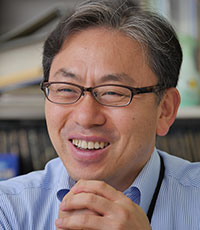Greeting

It has been decided to hold the 39th Annual Meeting of the Japan Society for Neuro-Oncology from Sunday, December 5th through Tuesday, December 7th, 2021 at the Arima Grand Hotel in Kobe, and preparations are actively under way. It is a great honor to greet you on behalf of the Institute of Advanced Biomedical Engineering and Science at Tokyo Women's Medical University, together with Professor Takakazu Kawamata, Head of the Department of Neurosurgery. We feel the weight of responsibility to enhance the preparations and management of this meeting so that it will be meaningful for members and participants.
Currently, due to the COVID-19 pandemic, various restrictions are imposed on daily life, and a variety of measures are necessitated in clinical practice and research. As one of the measures to prevent the spread of the virus, meetings and academic societies are actively being held by web conference, which is certainly a very convenient and time-efficient method that does not require travel. On the other hand, it is a fact that they pose many difficulties, such as the instability of the connection, troubles with the sound and difficulty to gauge the response to presentations or comments, not only during the normal "buttoned-down" conference but also in debates on non-agenda topics, making it difficult to have frank discussions.
At the other end of the spectrum from web conferences and web congresses are retreat-style study groups and congresses, one of which is this meeting, among the oldest related to brain tumors. Its origin is the Asilomar Conference of the United States, where malignant brain tumors are discussed about exhaustively. In Japan, it developed as the "Nikko Conference on Brain Tumor Research and Therapy" from 1980, the "Japanese Conference on Brain Tumor Research and Therapy" from 1992, and the "Annual Meeting of the Japan Society of Neuro-Oncology" from 2002. This meeting provides an opportunity not only to officially present cutting-edge research and ask and answer questions, but also to directly meet and discuss about simple questions, deep research, and unpublished research results, etc. From the beginning, it has consistently maintained a special style in which participants stay at one hotel in order to be physically and mentally distanced from their busy daily clinical practice, even if just for a short while, to talk about brain tumors from morning to evening without reserve during the session. Although it will depend on changes in social conditions, the secretariat is preparing to hold this meeting in the conventional style this time as well.
The theme this time is "One Team for Brain Tumor Moonshot." In order to improve the prognosis of brain tumors, it is necessary to take a patient-centric approach and for the neurosurgeons or pediatricians who are the attending physicians, as well as basic-science researchers, pathologists, radiologists, rehabilitation doctors, oncologists, nurses, occupational / physical therapists and social workers and other members to provide coordinated diagnoses and treatments as one team. The Japanese rugby team made it to the finals at the World Cup, achieving a "moonshot"-a big goal that seemed like an impossible "dream"- because of daily training as one team. The colloquial term "moonshot" comes from President Kennedy's declaration of the audacious goal of sending people to the moon, but it is also imbued with the auspicious meaning of making what seems to be an impossible dream come true. In order to achieve the moonshot of a dramatic improvement in the prognosis of brain tumors, we will invite people from as many disciplines as possible to become one team at this meeting. We would like to provide an environment where presentations can be given and multifaceted discussions held on basic and translational research leading to new diagnoses, treatments and support methods. As invited speakers, Dr. Roger Stupp, who achieved what could be called a moonshot by establishing two new treatments for glioblastoma through randomized trials, and other basic-science researchers and clinicians are due to give lectures. Please wait awhile for confirmation as it will be necessary to observe the status of the global response to COVID-19.
Arima Hot Spring is located in the same city of Kobe as Kobe University, where I studied medicine, and is one of the Three Old Hot Springs of Japan. The Arima Grand Hotel, which will be taking care of us this time, is reserved in its entirety, so we can have thorough discussions at the customary evening poster sessions. We are also planning excursions to Kobe and surrounding facilities. I am expecting that it will be a meaningful 2021 annual meeting for everyone, achieving with an in-person conference what would have been difficult with a web conference - namely, bringing people from different disciplines together serendipitously to give birth to new ideas, and allowing them to visit another region and experience the local culture and products.
We look forward to the submissions of lecture topics and participation of many people.
The 39th Annual Meeting of the Japan Society for Neuro-Oncology
Chairperson, Yoshihiro Muragaki
General Secretariat
Insitilute of Advanced BioMedical Engineering and Science
Tokyo Womens Medical University.
Secretariat of the 39th Annual Meeting of the Japanese Society of Neuro Oncology
c/o JTB Communication Design, Inc.
Celestine Shiba Mitsui Bldg. 13F
3-23-1 Shiba, Minato-ku, Tokyo 105-8335, Japan
E-mail: jsno39@jtbcom.co.jp
